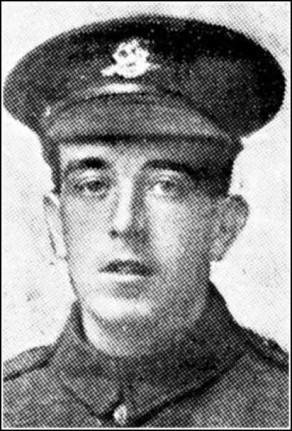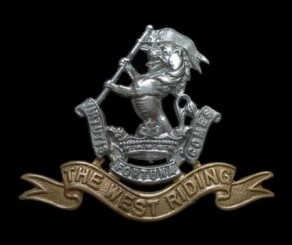THE HISTORY OF THE 62nd (WEST RIDING) DIVISION 1914-1919 Volume 1, by Everard Wyrall (John Lane the Bodley Head Limited Vigo Street, London, W.)
THE DEFENCE OF BUCQUOY
In many ways the 26th March, 1918, was a momentous and critical day. On this date the enemy further south, in the vicinity of Nesle, made energetic efforts to drive a wedge, and sever connection, between the British and French Armies. . .
On this day also the 62nd Division may be said to have entered properly into action, the Division defending Bucquoy with splendid gallantry. . .
The withdrawal of the 186th Infantry Brigade (Brig.-General J.G. Burnett), owing to the late receipt of orders, had to be carried out partly in daylight; the 2/7th Duke of Wellington’s (Lieut.-Col. F.S. Thackeray) moved back without interference and took up a position about 500 or 600 yards in front, but on the right flank of the 185th Infantry Brigade (Brig.- General Viscount Hampden). But the retirement of the 5th Duke of Wellington’s Regt. (Lieut. Col. J. Walker) was observed by the enemy, who followed closely in large numbers. B Company, the right flank of the Battalion (during the retirement) encountered an enemy cyclist patrol of forty men with light machine-guns in the Miraumont-Puisieux Road. The Company’s Lewis guns opened fire and dispersed the patrol, but one gun and a few men were cut off and captured by the enemy moving up the Miraumont Valley. Eventually the Battalion formed a defensive line about 300 yards east of the Bucquoy-Puisieux Road, with Lewis gun posts pushed forward. Three Companies were in the front line (A, B and C from right to left) and D Company was in support along the road.
The 2/4th Duke of Wellington’s (Major L.J. Coombe), having acted as outposts of the 2/7th and 5th Battalions, withdrew through the latter and took up a position in support just west of the Bucquoy-Puisieux Road. The 9th Durham Light Infantry (Pioneers) were about 300 yards west of the Puisieux-Bucquoy Road, in some old trenches. . .
The moves of the three Infantry Brigades were completed by about 8 a.m.
But the position of the 2/7th and 5th Duke of Wellington’s Regt. was by no means a sinecure; neither knew of the whereabouts of the other. The first named Battalion held a position right out in front of the left flank of the 5th Battalion and the right flank of the 8th West Yorks. (185th Infantry Brigade); the danger of penetration or envelopment was therefore great. . .
The right flank of the Division was always the point of anxiety. Here the 5th Duke of Wellington’s, who had almost to fight there way back to the positions they now held, had, at about 8-30 a.m. received the welcome addition of a section of four machine-guns from the M.G. Battalion. Two were placed immediately north of Puisieux to cover the Miraumont-Puisieux valley and two to cover the approaches from the direction of Achiet-le-Petit. The enemy at this period was well within range and all four machine-guns came immediately into action. Very soon afterwards the enemy was reported in Puisieux and on the high ground south of that place. ‘A’ Company of the 5th Duke of Wellington’s was, therefore, withdrawn and placed facing directly south towards Puisieux to protect the right flank. All the while the enemy was pressing vigorously, but was held back by rifle, Lewis-gun and machine-gunfire. The 9th Durham Light Infantry (under Major Wilson), in the support trenches about 300 yards west of the Puisieux-Bucquoy Road, established liaison with the 5th Duke of Wellington’s and the 2/4th Battalion was in support of both Battalions. Old trenches north of Puisieux afforded the troops some protection, but the right flank of the Division, though sorely pressed, was stubbornly defended. The enemy’s troops seemed countless, they came on unceasingly – Company after Company. Puisieux was full of them, while south of that place they could be seen advancing in great numbers westwards to Serre, and it was not long before rumours were in circulation that he had reached Hebuterne. The 5th Duke of Wellington’s held on as long as possible, frustrating a very determined effort about 11-30 a.m. to outflank the Battalion. But a move was imperative, and gradually, fighting all the way, Companies giving mutual support, the Battalion swung back its right and, in conjunction with D Company and the 9th Durham Light Infantry, took up a position just north of the Gommecourt-Puisieux Road from the south-east corner of Rossignol Wood, joining up with the left of the 2/4th Battalion. All the while the left of the 5th Battalion had been out of touch with the 2/7th, whose whereabouts were unknown. The position occupied at about 2-30 p.m. on the 26th by Colonel Walker’s Battalion was maintained throughout the day.
Meanwhile the 2/7th Duke of Wellington’s had taken heavy toll of the enemy as he passed south of the Battalion, on towards Puisieux. The Lewis gunners caught numbers of Germans in enfilade and did great execution. Colonel Thackeray, being unaware that the 5th Battalion lay some way behind his right flank, deeming his right in danger of being turned, had used B Company to form a defensive flank. At about 10-45 a.m. the enemy seemed to be right round the right flank of his Battalion and he therefore gave the order to retire, Company by Company, to his second position which had been selected along the southern and south-eastern exits of Bucquoy. The withdrawal was carried out with few casualties, but on the C.O. informing Brigade Headquarters of his movements, he received orders to move back to his old position. This was a difficult task, as the enemy had already occupied part of his old position. Nevertheless, owing mainly to the dash and gallantry of A Company, who rushed an enemy machine-gun section, killed the team and captured two machine-guns, in the main the previous position occupied by the Battalion was reoccupied, though the right flank was extended along an old system of trenches, south of Bucquoy. Touch had been obtained with the 8th West Yorks. on the left and when the movement had been carried out the 2/4th Duke of Wellington’s were in the gap between the right of the 2/7th and left of the 5th Battalion. . .
The continuous heavy attacks of that day of fierce fighting will long be remembered by the Division; attacks, pressed with great vigour by troops from whom the final fruits of victory had already been snatched. For by the afternoon of the 26th March the great German offensive, north of the Somme, had almost spent its fury. . .
It was, therefore, with a fury bordering on despair, that the enemy flung himself into the gap between the flanks of the IVth (62nd Division) and Vth (12th Division) Corps, in a last vain endeavour to drive a wedge between the right Corps of the Third Army. He almost succeeded, but not quite, and the reason he did not do so was largely owing to the fine defence put up by the 62nd Division about mid-day and during the afternoon of the 26th March, when attack after attack was launched against it, but fell back broken and shattered, like waves dashing themselves uselessly against a rocky coast. . .
During the afternoon no less than five attacks were made on the 2/7th Duke of Wellington’s Regt. and the 8th and 2/5th West Yorks. They were all bloodily repulsed. The first three reached a line about 400 yards in front of the wire entanglements which protected the frontage of the West Yorkshiremen. Here the enemy’s troops not only came under very heavy frontal fire from machine-guns, Lewis guns and rifles, but, on each occasion were caught in enfilade by the Lewis gunners of the 2/7th Duke of Wellington’s, firing from the forward trenches of the latter Battalion. These three attacks were obliterated. The last two did indeed succeed in reaching the wire, but here the same fate met the enemy as on his three previous attempts and only a few survivors crawled back to the German lines.
It is impossible not to admire the bravery of the enemy’s troops, but they had opposed to them tough and hardy men who had served their apprenticeship with Failure, Disappointment and Suffering and who, but a year previously, had passed eastwards only a little south of the line they then held, somewhat green as soldiers, somewhat young in knowledge of warfare, yet just as high in spirit as on this day of March, 1918, when tried in the fire of battle, they were found true metal. “It was amazing to see,” said a C.O. of his Battalion, “how cheerful all ranks were in this time of strain, partly because they knew what depended on their ‘sticking’ it and partly because they could see the damage they inflicted, but mainly because of the sporting spirit that was in them; the more difficult and desperate the circumstances the more cheery and self-reliant they became.”
And this being true of one Battalion was true of all, for that was the spirit of the men, of that Yorkshire which bred them. . .
[Albert Donald was killed in action during the defence of Bucquoy on the 26th March.]










No comments yet.